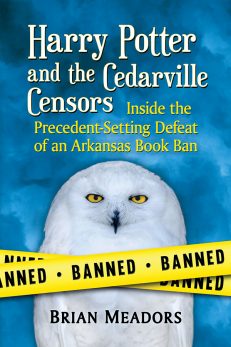Harry Potter and the Cedarville Censors
Inside the Precedent-Setting Defeat of an Arkansas Book Ban
$29.95
In stock
About the Book
In 2002, the Cedarville School Board in Crawford County, Arkansas, ordered the removal of J.K. Rowling’s Harry Potter books from library shelves, holding that “witchcraft or sorcery [should not] be available for study.” The Board picked some formidable adversaries. School librarian Estella Roberts, standing on policy, had the books reviewed—and unanimously approved—by a committee of teachers and administrators that included a child and a parent. Not satisfied with the Board’s half-measure permitting access to the books with parental approval, 4th-grader Dakota Counts and her father Bill Counts sued the school district in Federal court, drawing on the precedent Pico v. Island Trees to reaffirm that Constitutional rights apply to school libraries. Written by the lawyer who prosecuted the case, this book details the origins of the book ban and the civil procedures and legal arguments that restored the First Amendment in Cedarville.
About the Author(s)
Bibliographic Details
Brian Meadors
Format: softcover (6 x 9)
Pages: 217
Bibliographic Info: appendix, notes, bibliography, index
Copyright Date: 2019
pISBN: 978-1-4766-7497-1
eISBN: 978-1-4766-3583-5
Imprint: McFarland
Table of Contents
Acknowledgments ix
Preface 1
Introduction 3
1. An Inspirational Wednesday 5
2. A Brief History of Harry Potter 13
3. Legal Backstory: Gobitis & Barnette (Students Have Constitutional Rights) 17
4. Estella Fights Back 21
5. Legal Backstory: Tinker (Students Have a Right to Non-Disruptive Speech) 28
6. School Boards 31
7. Legal Backstory: Pico (Students’ Free Speech Rights Apply to School Libraries) 40
8. Like Magic, a Client Appears 53
9. Intolerant of Tolerance 61
10. Adversaries and Allies 77
11. Legal Backstory: Sund (Hiding a Library Book Is the Same as Censoring It) 91
12. Building the Case 96
13. “There are schools of magic” 106
14. Dakota Counts 119
15. The Expert 133
16. Legal Backstory: Bystrom (8th Circuit Adopts the Pico Plurality) 145
17. Summary Judgment 158
18. Carrot and Stick 164
19. The Fruit of the Litigation Tree 174
Appendix: Judge Hendren’s Opinion (Counts v. Cedarville School District, 295 F.Supp.2d 996 [2003]) 183
Chapter Notes 195
Bibliography 199
Index 205
Book Reviews & Awards
• “An engaging read that documents the twists and turns of an ultimately unsuccessful book challenge to the first two Harry Potter books…. Meadors does a satisfying job of setting the scene… [He] provides surprisingly sympathetic portrayals of the primary players… He’s particularly effective at explaining court procedures, taking the time to ensure that readers can fully enjoy the happy, precedent-setting ending. The title will draw in book lovers, and the narrative will keep them reading through to the gratifying conclusion.”—Booklist
• “Recommended… The memoir provides detailed insights into one of the many First Amendment battles Rowling’s series has faced in the two decades since its initial publication.”—Children’s Literature Association





